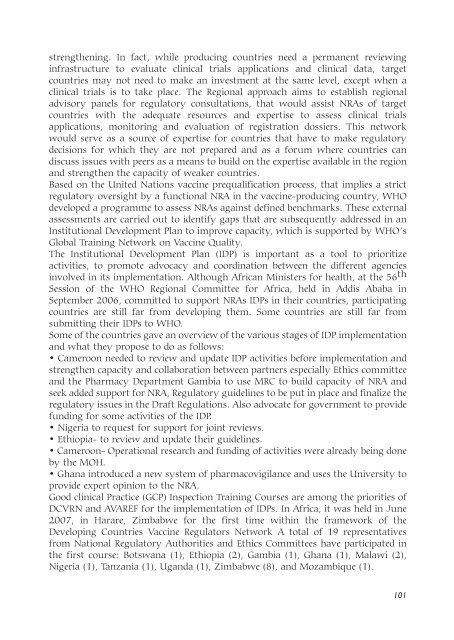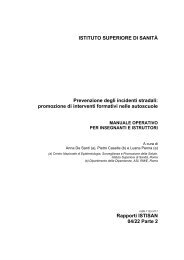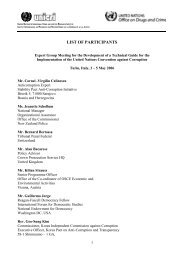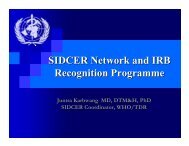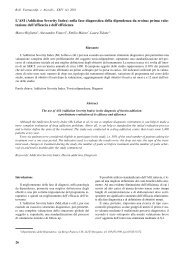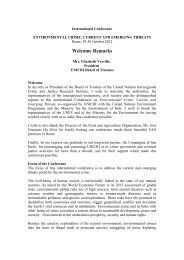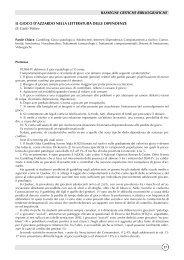Biomedical Research in Developing Countries - UNICRI
Biomedical Research in Developing Countries - UNICRI
Biomedical Research in Developing Countries - UNICRI
You also want an ePaper? Increase the reach of your titles
YUMPU automatically turns print PDFs into web optimized ePapers that Google loves.
strengthen<strong>in</strong>g. In fact, while produc<strong>in</strong>g countries need a permanent review<strong>in</strong>g<br />
<strong>in</strong>frastructure to evaluate cl<strong>in</strong>ical trials applications and cl<strong>in</strong>ical data, target<br />
countries may not need to make an <strong>in</strong>vestment at the same level, except when a<br />
cl<strong>in</strong>ical trials is to take place. The Regional approach aims to establish regional<br />
advisory panels for regulatory consultations, that would assist NRAs of target<br />
countries with the adequate resources and expertise to assess cl<strong>in</strong>ical trials<br />
applications, monitor<strong>in</strong>g and evaluation of registration dossiers. This network<br />
would serve as a source of expertise for countries that have to make regulatory<br />
decisions for which they are not prepared and as a forum where countries can<br />
discuss issues with peers as a means to build on the expertise available <strong>in</strong> the region<br />
and strengthen the capacity of weaker countries.<br />
Based on the United Nations vacc<strong>in</strong>e prequalification process, that implies a strict<br />
regulatory oversight by a functional NRA <strong>in</strong> the vacc<strong>in</strong>e-produc<strong>in</strong>g country, WHO<br />
developed a programme to assess NRAs aga<strong>in</strong>st def<strong>in</strong>ed benchmarks. These external<br />
assessments are carried out to identify gaps that are subsequently addressed <strong>in</strong> an<br />
Institutional Development Plan to improve capacity, which is supported by WHO’s<br />
Global Tra<strong>in</strong><strong>in</strong>g Network on Vacc<strong>in</strong>e Quality.<br />
The Institutional Development Plan (IDP) is important as a tool to prioritize<br />
activities, to promote advocacy and coord<strong>in</strong>ation between the different agencies<br />
<strong>in</strong>volved <strong>in</strong> its implementation. Although African M<strong>in</strong>isters for health, at the 56 th<br />
Session of the WHO Regional Committee for Africa, held <strong>in</strong> Addis Ababa <strong>in</strong><br />
September 2006, committed to support NRAs IDPs <strong>in</strong> their countries, participat<strong>in</strong>g<br />
countries are still far from develop<strong>in</strong>g them. Some countries are still far from<br />
submitt<strong>in</strong>g their IDPs to WHO.<br />
Some of the countries gave an overview of the various stages of IDP implementation<br />
and what they propose to do as follows:<br />
• Cameroon needed to review and update IDP activities before implementation and<br />
strengthen capacity and collaboration between partners especially Ethics committee<br />
and the Pharmacy Department Gambia to use MRC to build capacity of NRA and<br />
seek added support for NRA, Regulatory guidel<strong>in</strong>es to be put <strong>in</strong> place and f<strong>in</strong>alize the<br />
regulatory issues <strong>in</strong> the Draft Regulations. Also advocate for government to provide<br />
fund<strong>in</strong>g for some activities of the IDP.<br />
• Nigeria to request for support for jo<strong>in</strong>t reviews.<br />
• Ethiopia- to review and update their guidel<strong>in</strong>es.<br />
• Cameroon- Operational research and fund<strong>in</strong>g of activities were already be<strong>in</strong>g done<br />
by the MOH.<br />
• Ghana <strong>in</strong>troduced a new system of pharmacovigilance and uses the University to<br />
provide expert op<strong>in</strong>ion to the NRA.<br />
Good cl<strong>in</strong>ical Practice (GCP) Inspection Tra<strong>in</strong><strong>in</strong>g Courses are among the priorities of<br />
DCVRN and AVAREF for the implementation of IDPs. In Africa, it was held <strong>in</strong> June<br />
2007, <strong>in</strong> Harare, Zimbabwe for the first time with<strong>in</strong> the framework of the<br />
Develop<strong>in</strong>g <strong>Countries</strong> Vacc<strong>in</strong>e Regulators Network A total of 19 representatives<br />
from National Regulatory Authorities and Ethics Committees have participated <strong>in</strong><br />
the first course: Botswana (1), Ethiopia (2), Gambia (1), Ghana (1), Malawi (2),<br />
Nigeria (1), Tanzania (1), Uganda (1), Zimbabwe (8), and Mozambique (1).<br />
101


